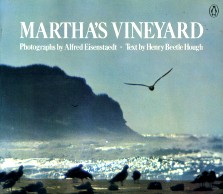|
Martha's
Vineyard / photographs by Alfred Eisenstaedt ; text by Henry
Beetle Hough. - New York : Penguin books, 1979. -
70 p.-[13] leaves of plates : ill.,
map ; 22x25 cm.
ISBN
0-14-005165-1
|
|
Alfred
Eisenstaedt [1898-1995] et Henry Beetle Hough [1896-1985] sont tous
deux
septuagénaires quand ils entreprennent la
réalisation de
ce recueil consacré à Martha's Vineyard.
Alfred Eisenstaedt, photographe de
renommée internationale est
né en Prusse orientale, a émigré aux
Etats-Unis en
1935, a découvert Martha's Vineyard en 1935 et, de 1950
à
sa mort, n'a jamais manqué d'y passer le mois
d'août (on raconte qu'il interrompit un reportage aux
Galapagos
pour ne pas rompre cette habitude) ; il est mort dans
son cottage de Menemsha.
Henry Beetle Hough est originaire de Pennsylvanie
; il découvre
Martha's Vineyard en vacancier avant de reprendre, en 1920, la
responsabilité administrative et rédactionnelle
de la Martha's Vineyard
Gazette (un hebdomadaire créé en
1846), fonctions qu'il assume avec sa femme jusqu'en 1968.
Les regards croisés de ces deux
témoins impliqués
— et rien moins que distants — sont l'occasion
d'une
réflexion sur l'écoulement du temps ; le
photographe et
le chroniqueur y contribuent sur des modes
spécifiques …
sans priver le lecteur d'y prendre sa part, en accord ou en rupture
avec l'un ou l'autre.
|
| EXTRAIT |
In
the island towns the old life goes on : church suppers, town
meetings, schools and school sports — so little different in
essence from the life of the generations gone. Some —
sociologists maybe — would make distinctions, stressing the
basic
changes modern technological advances have made ; and the
sociologists would be right. Drugstore now close at six instead of ten
— for television has tolled the groups of bystanders and
late-stayers into homes instead of stores. The downtown stores have no
cast-iron stoves with elderly men sitting around, smoking, sometimes
talking, sometimes keeping comfortable silence.
A time
came when the older generation stayed home after supper and the
younger generations, in new freedom, walked around downtown, stood on
the corner in front of the drugstore or in the drugstore itself. Or, as
views broadened and the automobile age evolved, the young people drove
on the endless night errand of the young, arriving nowhere but home
again at last.
Civilization
has changed again, progressed, moved on, adopted the new
patterns of convenience, settled into habits of its own age ;
and
Martha's Vineyard is involved as all other places in this age and this
civilization ; yet it retains its flavor, purposes, character.
Its
basic challenges and decisions rest in the balance between man and
nature, sea and shore, as in the time of the whaling
captains.
Modern yet not modern, ancient yet not ancient, the island's
contradictions are themselves an elusive but genuine expression of an
undefeated insularity.
☐
p. 70 |
|
| COMPLÉMENT
BIBLIOGRAPHIQUE |
- «
Martha's Vineyard » photographs by Alfred Eisenstaedt, text
by Henry Beetle Hough,
New York : Viking press (A Studio book), 1970, 1975
|
|
|
→ Elizabeth Hawes,
« Summers with Somerset » with
photographs by Alfred Eisenstaedt, Martha's
Vineyard Magazine [en
ligne]
|
|
|
| mise-à-jour : 29
avril 2019 |

|
|
|
|